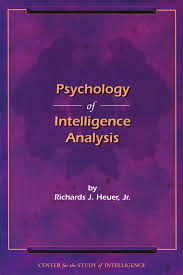Part of the Casswiki article series Books

Psychology of Intelligence Analysis is a book by Richard J. Heuer, Jr., first published in 1999 by CIA’s Center for the Study of Intelligence.
From the author’s preface:[1]
This volume pulls together and republishes, with some editing, updating, and additions, articles written during 1978–86 for internal use within the CIA Directorate of Intelligence. Four of the articles also appeared in the Intelligence Community journal Studies in Intelligence during that time frame. The information is relatively timeless and still relevant to the never-ending quest for better analysis.
The articles are based on reviewing cognitive psychology literature concerning how people process information to make judgments on incomplete and ambiguous information. I selected the experiments and findings that seem most relevant to intelligence analysis and most in need of communication to intelligence analysts. I then translated the technical reports into language that intelligence analysts can understand and interpreted the relevance of these findings to the problems intelligence analysts face.
The result is a compromise that may not be wholly satisfactory to either research psychologists or intelligence analysts. Cognitive psychologists and decision analysts may complain of oversimplification, while the non-psychologist reader may have to absorb some new terminology.
Unfortunately, mental processes are so complex that discussion of them does require some specialized vocabulary. Intelligence analysts who have read and thought seriously about the nature of their craft should have no difficulty with this book. Those who are plowing virgin ground may require serious effort.
In this simplified work, Heuer emphasizes the importance of not only analyzing the substance of intelligence problems, but also of understanding the analytic thought processes. He argues that thinking analytically is a skill that can be learned and improved with practice - like riding a bike. He delve into cognitive biases and shares techniques for confronting such biases and diminishing their impact.
This book’s Introduction presents “three fundamental points about the cognitive challenges intelligence analysts face”:[2]
The mind is poorly “wired” to deal effectively with both inherent uncertainty (the natural fog surrounding complex, indeterminate intelligence issues) and induced uncertainty (the man-made fog fabricated by denial and deception operations).
Even increased awareness of cognitive and other “unmotivated” biases, such as the tendency to see information confirming an already-held judgment more vividly than one sees “disconfirming” information, does little by itself to help analysts deal effectively with uncertainty.
Tools and techniques that gear the analyst’s mind to apply higher levels of critical thinking can substantially improve analysis on complex issues on which information is incomplete, ambiguous, and often deliberately distorted. Key examples of such intellectual devices include techniques for structuring information, challenging assumptions, and exploring alternative interpretations.
This book is recommended for its information regarding flaws of reasoning, analysis as well as methods of improvement thereof is delivered briefly thus making it an excellent introductory read for anyone interested in the subject.
This book is available as a free PDF download.
Further reading
See also
- Psychology
- Cognitive bias
